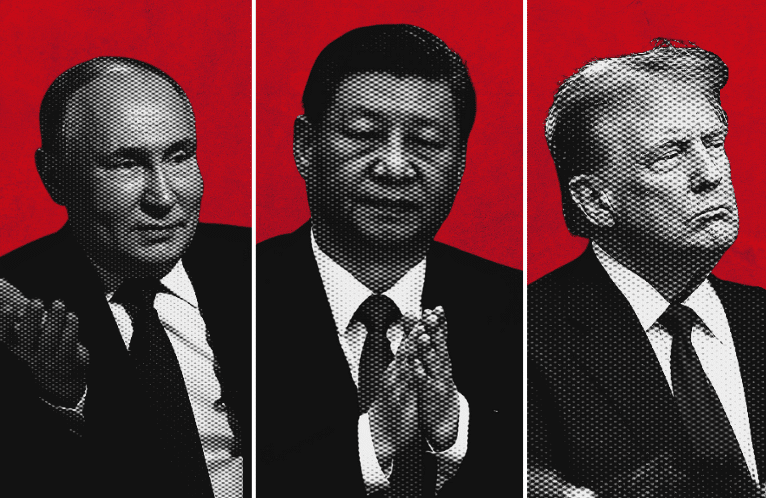Why Some Chinese Like Donald Trump
There’s not just a thousand Hamlets in a thousand people’s eyes. There’s also more than one face of Donald Trump, in 1.3 billion Chinese people’s eyes.
That famous Chinese expression about the many interpretations of Shakespeare — and the world — describes how the mainland sees the leading Republican presidential candidate.
Since hitting the presidential campaign trail, the GOP frontrunner has been far from friendly to China, repeatedly criticizing the world’s second largest economy’s “unfair and unlawful practice” of tariffs, accusing Beijing of manipulating its currency and even threatening a 45 percent tariff on Chinese exports to the United States.
But oddly enough, CNBC spoke to a few Chinese who actually like this U.S. presidential candidate.
There’s a range of reasons, from his history as a reality-television star to admiring his daughter’s appearance.
A boss with business wisdom
“He is so confident and cool in the show,” said 22-year-old, Hong-Kong based Vennie Kang, who is familiar with Trump from watching his reality talent game show “The Apprentice” when she was still a teenager. “He likes to control everything, but truly has business wisdom.”
U.S. reality shows have been popular among Chinese youths since the early 2000s, a time when English teachers on mainland China started to encourage students to learn the language through studying American pop culture. As “The Apprentice” was on the must-watch list for many, real estate mogul Donald Trump — the show’s executive producer and host — became widely known in China.
“The way he says ‘you are fired’ at the end of each episode to eliminate contestants did really leave me a deep impression,” said Kang, who graduated from college last year and now works in the finance industry.
A candidate who knows how to make deals
To be sure, many Chinese were offended when Trump mocked Asian businessmen in broken English during a campaign rally in Iowa last year.
“Negotiating with Japan, negotiating with China, when these people walk into the room, they don’t say, ‘Oh hello, how’s the weather? So beautiful outside, isn’t it lovely? How are the Yankees doing? Oh, they are doing wonderful, great.'” said Trump, followed by imitating his Asian business partners with an accent, “They say, ‘We want deal!'”
To some, Trump has a big mouth, but others say he at least gets one thing right.
“It’s not necessarily a bad thing if the U.S. president used to be a businessman,” said Hang Su, a Chinese young professional living in New York. “He would understand better how to make deals and how to compromise. The hate and love relationship between the U.S. and China will remain unchanged.”
Like Su, most mainland Chinese do not care about candidates’ stances on U.S. domestic issues, and instead focus on the U.S.-Sino business relationship. In many Chinese people’s eyes, Hillary Clinton, the Democratic front-runner, would act tougher to China than Trump, once elected.
“Hillary Clinton is always suspicious about China,” said 29-year-old, Hong Kong-based Bai Yifan, who initially thought Trump was a joke when he declared his candidacy for president. “Politicians and businessmen are totally different. Trump would understand that China is the largest trading partner of the U.S., and he wouldn’t annoy China on ideology matters like human rights, etc.”
“From the Chinese perspective, I hope the U.S. could elect a president who can bring a win-win situation,” he added.
A successful “Fu Er Dai”
Trump’s inherited wealth was also a draw for some Chinese.
He’s a successful “Fu Er Dai” to Lili Fu, a Shenzhen-based young professional. In the Chinese language, “Fu Er Dai” refers to the second generation of the rich, or those who inherited a great deal of wealth from their affluent parents. The term, however, is usually used in negative news headlines as the second-generation is seen as spending extravagantly and as keen to show off on social media, stirring public anger among Chinese netizens.
In Fu’s eyes, Donald Trump is more ambitious than many “Fu Er Dai” in China today.
“He borrowed $1 million from his dad to get started and then has built the Trump Empire to what it is day,” said Fu. “I read his biography. He had been through his ups and downs, not always good times.”
The father of Ivanka Trump
Donald Trump can also thank his beautiful daughter, Ivanka Trump, for winning him hearts among Chinese people. Seen as a successful businesswoman and tasteful designer as well as a happy wife and mother, Ivanka, 34, has a huge fan base in China.
“She is so pretty and elegant,” said Fu. “I think it has something to do with her education and family.”
Fu’s view is shared by 36-year-old Joe Wu, who is based in New York.
“His children are very well educated,” said Wu. “He doesn’t drink alcohol and he doesn’t allow his children to drink, smoke, do drugs or tattoos. Trump himself is a pretty disciplined person.”
Both Kang and Wu believe Trump’s extreme statements are just to get public attention and expect him to soften his positions soon.
“Trump is more consistent than other candidates,” said Wu. “Now he has fewer competitors, [so] he can spend more time to talk about real issues.”
“Institutional failure of the Western democracy”
While many Chinese merely find it entertaining to watch a “politically incorrect” candidate in the U.S. presidential election, Chinese state media has used Trump’s popularity to mock Western democracy.
In an editorial published on March 14, Chinese state media Global Times said Trump “has opened a Pandora’s box in U.S. society,” adding the U.S. now faces “the prospect of an institutional failure.”
After describing how Donald Trump went from being “a clown” to “the biggest dark horse,” the article concluded: “The U.S. had better watch itself [to avoid becoming] a source of destructive forces against world peace, more than pointing fingers at other countries for their so-called nationalism and tyranny.”
By QIAN CHEN Mar. 29, 2016 on CNBC
Read more here








